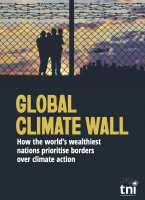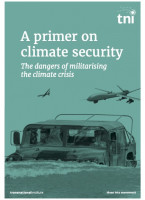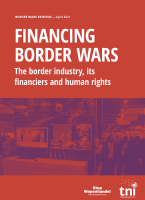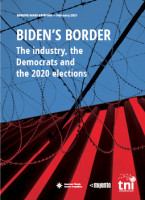Cashing in on Crisis How the world's largest investors fuel and profit from climate change and border militarization
Topics
This briefing illustrates how the world's biggest asset managers - BlackRock, Vanguard, & StateStreet - are fuelling and profiting from the climate crisis through investments in polluting fossil fuels, destructive agribusiness, and violent border regimes.
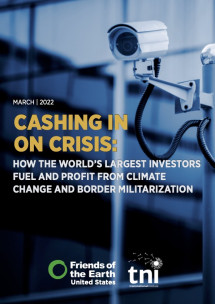
Download the full brief here.
Download the Infographic here.
Introduction
With trillions of dollars under management, institutional investors play a pivotal role in enabling the climate crisis by financing fossil fuels and industrial agricultural commodities. These industries and their value chains are responsible for increasing greenhouse gas emissions, widespread environmental destruction, and gross human rights abuses. Increasingly, activists, shareholder advocates, and policymakers are seeking to stop the pipeline of money flowing to the companies and industries most responsible for the climate crisis. The role of large asset managers such as BlackRock, Vanguard, and State Street in bankrolling the climate emergency has rightly made them targets of aggressive campaigns demanding they divest from fossil fuels, defund deforestation, and respect the rights of Indigenous Peoples and local communities.
Investing directly in the companies responsible for the climate crisis is not the only way large asset managers are fueling global instability. BlackRock, Vanguard, State Street and many other financial giants also facilitate human rights violations through their support of the border and surveillance industry (BSI). This industry is in the business of separating families, eroding civil liberties, and promoting systemic racism and ethnonationalism around the world. BSI companies “provide the hardware, software and services to enable the containment, exclusion, surveillance, transportation and detention of migrant populations”. This includes companies that operate private prisons and migrant detention centers and develop the surveillance technology and biometric systems used to facilitate detentions, deportations, racial profiling, border militarization, and criminalization of migrants.
In a warming world subject to increasing natural disasters and extreme weather events, migration is a form of climate adaptation. People embark on dangerous journeys to seek safety, security, and dignity in the face of environmental, economic, and political upheaval. In response, governments should ensure safe pathways for migration.
Yet, as climate change is increasingly being framed as a national and international security threat, militarized responses to migration through the proliferation of “[walls], bullets, drones and cages are presented as essential to eliminating this ‘threat.’
This brief illustrates how BlackRock, Vanguard, and State Street are financing the climate crisis through investments in fossil fuel and agribusiness companies, which drives displacement, and then profit from racist and xenophobic responses to migration through investments in BSI companies. It discusses these asset managers’ failure to adopt effective human rights policies that would ensure their investments are not enabling human rights violations and are aligned with international frameworks, such as the UN Guiding Principles on Business and Human Rights, and the OECD Guidelines for Multinational Enterprises. It calls on governments, investors, and climate movements — particularly the Global North climate movement — to embrace an intersectional, rights-based approach rooted in principles of climate justice when engaging in efforts to transform financial institutions.
